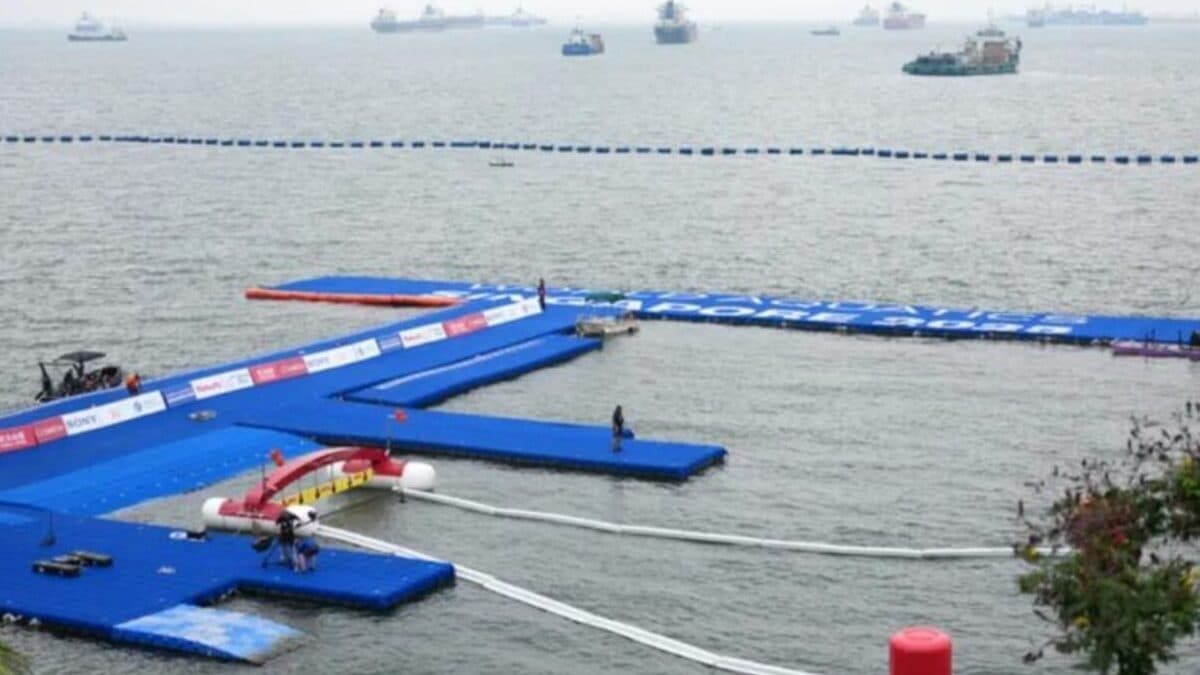World Aquatics confirms safe water quality for Sentosa open water races after delay
The World Aquatics Championships open water races at Sentosa will go ahead today (16 July) after new tests showed E. coli levels had returned to safe limits, following a one-day postponement due to earlier contamination concerns.

- Fresh tests on 15 July confirmed water at Sentosa met World Aquatics’ safety standards.
- The men’s 10km and women’s 10km races, postponed earlier, will now be held today.
- Continuous water quality monitoring will be conducted to protect athletes’ health.
The open water swimming events of the 2025 World Aquatics Championships will proceed today (16 July) at Sentosa after fresh tests confirmed that water conditions are safe for competition.
World Aquatics, the governing body for aquatic sports, announced on Wednesday morning that samples collected on 15 July had met its required safety standards for E. coli levels, allowing the men’s and women’s 10km races to resume.
The men’s 10km race is scheduled to begin at 1pm Singapore time, followed by the women’s 10km race at 4pm.
Officials had postponed both events on Tuesday after routine tests detected elevated concentrations of E. coli bacteria that exceeded acceptable thresholds. The decision was made as a precaution to protect athletes’ health.
According to the latest statement, three water samples collected along the Sentosa race course at 5pm on 15 July showed E. coli readings ranging from “good” to “excellent” under World Aquatics’ internal regulations.
Brent Nowicki, World Aquatics’ executive director, said that the improved results followed close collaboration between the organising committee, local authorities, and independent testing agencies.
“Safety is our top priority. The rescheduled events will proceed today following confirmation that the water meets all necessary health and safety standards,” Nowicki said.
He added that while the exact source of the earlier contamination remains under investigation, the decision to delay the races was made to ensure full compliance with health guidelines and to minimise any risk to competitors.
E. coli, a bacteria found naturally in the intestines of humans and animals, can cause illness when harmful strains are ingested. Exposure to high levels in water may lead to symptoms such as diarrhoea, stomach cramps, and vomiting.
Nowicki emphasised that World Aquatics adheres to the World Health Organization’s limits for recreational water use and employs accredited laboratories for testing.
“Regular monitoring has been a key part of our preparations, and we will continue to conduct water quality tests throughout the Championships,” he said.
Leading up to this week’s races, water samples from Sentosa had consistently met the required safety standards, according to organisers.
The contamination detected in samples taken last Sunday prompted swift action, including the postponement of both the men’s and women’s 10km races originally scheduled for 15 July.
Athletes were informed of the delay on Tuesday morning, while teams and officials worked with organisers to review the revised schedule.
Nowicki said World Aquatics was “grateful for the understanding and cooperation of athletes and national teams,” noting that rescheduling such events is logistically complex.
Tickets issued for the original women’s 10km race remain valid for today’s rescheduled session. Ticketholders who cannot attend may request refunds through Sistic by 20 July.
Sentosa’s waters are serving as the venue for both open water swimming and high diving events at this year’s World Aquatics Championships.
This marks the first time the Championships are being hosted in a Southeast Asian nation. Singapore is staging the event across multiple venues, including the Singapore Sports Hub, OCBC Aquatic Centre, and Sentosa.
The competition, which began on 11 July and runs until 3 August 2025, features five disciplines: swimming, diving, artistic swimming, water polo, and open water swimming.
Organisers have emphasised that maintaining safe environmental conditions is crucial, especially for outdoor aquatic events that depend on natural water bodies.
In recent years, several international competitions have faced challenges related to water quality, prompting sports bodies to strengthen monitoring protocols and contingency plans.
World Aquatics introduced enhanced environmental testing standards following past incidents in Tokyo, Paris, and Doha, where bacterial levels had temporarily exceeded safe limits.
For the Singapore edition, organisers have been conducting daily water tests in collaboration with local environmental authorities, as well as independent laboratories, to ensure full transparency and compliance.
The Singapore Swimming Association, a co-host of the Championships, welcomed World Aquatics’ latest confirmation, noting that it reflects the country’s commitment to safety and operational excellence.
A spokesperson said, “We are pleased that competition can proceed safely. Singapore takes pride in upholding international standards for sporting events and environmental management.”
Athletes have also expressed relief at the decision, with several teams resuming warm-up sessions early this morning.
Australia’s open water coach, Mark Thompson, told reporters that while the delay was inconvenient, it was “absolutely the right call.”
“No one wants to compete under unsafe conditions. We appreciate the organisers’ quick response and transparency,” he said.
The men’s 10km race, the premier event in open water swimming, typically draws Olympic-calibre athletes who must contend with factors such as water currents, visibility, and temperature.
Meanwhile, the women’s 10km race later in the day is expected to feature a competitive field that includes defending world champion Leonie Beck of Germany and Olympic medallist Ana Marcela Cunha of Brazil.
The updated schedule means that subsequent open water events, including the mixed team relay, may also see minor timing adjustments, though World Aquatics confirmed that all competitions will still be completed within the original Championship period.
Spectators attending the races have been advised to arrive early, with security checks and limited shoreline access in place to ensure smooth operations.
As Singapore hosts its first-ever World Aquatics Championships, the successful management of this water quality issue is being viewed as an important test of the country’s readiness to handle major international sporting events.
With improved conditions confirmed and the competitions set to resume, attention now turns back to the athletes — and to the medal races in the waters off Sentosa.







